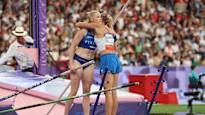Atmosphere, events within the team, inappropriate behavior situations and outfits. These became big pain points in the Paris Olympic survey, which Urheilu obtained.
When the Paris Olympic Games, which ended in August, had produced a historic result of zero medals for Finland, four competitive athletes anonymously gave very blunt feedback about the Olympic Committee’s success in their competition project.
When the athletes opened up, for example, the lack of togetherness was brought up and the athletes felt that they were left alone when they arrived at the competition village. Some had even cried from anxiety. The athletes were shaken by the management’s lack of passion and apathy towards elite sports and sports. The athletes’ open letter as such was published by, for example Ilta-Sanomat.
After the Games, the Olympic Committee announced that they did not lead the competition team Leena Paavolainen and director of the elite sports unit Matti Heikkinen continue with your duties.
Also one of the experts of the elite sports unit Liisa Ahlqvist-Lehkosuo started to send the Olympic team’s athletes and background people an extensive package of questions, so that the Olympic Committee would have material to evaluate which things were successful and where they failed. The situation was not exceptional, but a similar survey is always conducted after the Olympic Games. The grade range is typical, i.e. 1–5.
A comprehensive set of respondents
A total of 57 athletes responded by the deadline, i.e. by September 3, 42 or 73.7 percent, and 50 or 64.9 percent of 77 background persons, such as coaches, guardians, doctors or bodyguards. The total response rate was therefore 68.7, which is quite comprehensive.
The elite sports unit will submit the results of the anonymized survey to be evaluated by the main financier of the Olympic Committee, i.e. the Ministry of Education and Culture, by November 30. On that day, the Olympic Committee will receive a new chairman and board at its autumn meeting. After the Ministry’s evaluation, the results will be made public.
However, Urheilu received the survey report already on Friday. The report, especially the feedback given by the athletes to the Olympic Committee, turns out to be overwhelming.
The joint events organized by the athletes for the team in Paris receive the lowest rating of the entire survey, 3.02. Other atmosphere issues, such as interaction within the team (3.48) and team atmosphere (3.64) are also evaluated quite critically. The athletes were asked five different ways about enjoying themselves in the competition village, and the ratings ranged from 3.02 to 3.78.
Kisapappi was the primus
Among the key personnel behind the team, the highest rating from the athletes is the chaplain (4.73) and the second highest is Physiotherapists and other body care workers (4.56). Mental coaching gets a clearly lower rating (3.67).
Special attention is paid to the team’s equipment and clothing, which do not receive the statesman or woman treatment either from the athletes or from the background people. Athletes got a rating of 3.24, background 3.60.
In the accountability section of the survey, the athletes and background personnel have experienced the team management’s success in terms of zero tolerance for bullying, harassment and other inappropriate behavior to be a clearly more significant issue in terms of substance. 10 percent of the athletes and as many as 17.3 percent of the background think that this was not successful or was only partially successful.
24.4 percent of athletes and 22 percent of people with backgrounds felt that they were at most partially successful in preparing operating instructions for such situations.
Egg or chicken?
17.5 percent of the athletes were of the opinion that health and safety matters were at most partially successful, 21.6 percent of the background staff.
On average, the responsible teams of different sports received praise and grades starting with the number 4.
The survey did not deal with an issue that, according to Urheilu’s information, disturbed some of the athletes a lot: the visits and stay of people outside the team, such as politicians, sponsors or the relatives of members of the competition team, in the otherwise strictly closed competition village.
71.4 percent of the Finnish athletes answered that they did not reach their performance goal. 75.7 percent fell short of its investment target. The meaning of this is not clear from the survey for the vague answers – i.e. whether the egg came first or the chicken.
